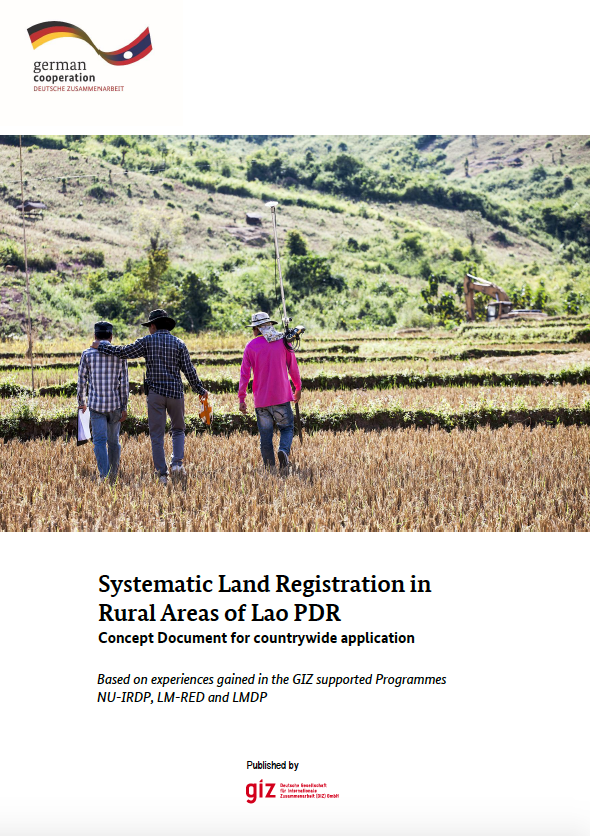Resource information
In principle, all land in the Lao People's Democratic Republic (Lao PDR) belongs to the National Community, although citizens and legal entities have the right to receive permanent land use rights. These land use rights are certified in the form of land titles, which currently can be issued to individuals (persons, couples, joint ownership or legal entities), collectives and state land. The mandate to survey and adjudicate land parcels and to issue the land titles rests with the Department of Land Administration (DoLA) under the Ministry of Natural Resources and Environment (MoNRE) and their decentralized offices at Provincial (PONRE) and District level (DONRE).
Land reform in Lao PDR is currently in a phase of review and renewal. A draft National Land Policy has been prepared and could be endorsed during 2015, pending some constitutional amendments. Based on the outcome of the discussions surrounding the new land policy, a revised Land Law and a revised Forest Law will be finalised.
The 7th National Socio-Economic Development Plan (NSEDP) 2010-2015 states a target of a total of 1 million land titles to be issued by 2015. Systematic land registration and titling in Lao PDR started in 2001 with first pilot activities and has reached a total of 806,000 land titles (November 2014). Land titles are issued under systematic and sporadic registration schemes. The vast majority of the land titles have been issued in urban and peri-urban areas, while rural areas have only been reached in the case of donor-funded project support.
Yet, 85% of the Lao population lives in the rural areas and derives its main income from crop production, livestock and the use of natural resources. Access to sufficient and sustainably usable land is a crucial requirement for food security and livelihood improvement for the rural population. It is specifically in the rural areas that large tracts of land have been allocated over the last two decades as land concessions e.g. for rubber, sugarcane or pulpwood production. Mining concessions and large hydropower schemes form an important pillar of the national economy and cover important stretches of land in rural areas of Lao PDR. The absence of approved zoning and land use planning, the unregulated access to land resources and the lack of legal tenure security are major causes of poverty and conflict and hamper economic development in Lao PDR. The Government of Lao PDR has identified this as a central problem. The imminent approval of the National Land Policy and the revision of the Land Law are seen as important steps towards an approach of “accelerated land titling” which is now proposed by the Government.
The German Government has provided technical assistance to the land sector in Lao PDR since 2005. Initially, this support was provided as a contribution to land policy development under the Lao Land Titling Project II, together with World Bank and AusAID. Since 2008, German funded development programs (LMRP, LM-RED and NU-IRDP) have initiated, piloted and tested approaches of improved land use planning (PLUP) and land registration in rural areas. Since January 2015, the new Lao-German Land Management and Decentralized Planning (LMDP) Programme was created with a focus on scaling up systematic land registration schemes in 4 Provinces (Luang Namtha, Sayabouri, Houaphan and Khammouane) and at least 8 rural districts.
This document attempts to summarize the experiences gained through the various pilot and model development activities tested so far, as well as to design a standardized system for systematic land registration in rural areas of Lao PDR. This comprehensive and inclusive system also covers some parts which have not yet been sufficiently piloted but constitute proposals on how to complement the overall approach, e.g. in terms of communal land registration. Any parts of the document suggesting new and untested methodologies will be clearly highlighted. The final objective is to describe an approach to land registration which encompasses all existing land parcels and all categories of land tenure located within the administrative boundaries of a given village or a selected target area.
The final concept document will constitute a guidebook on systematic land registration in rural areas of Lao PDR and will provide a basis for the implementation of the accelerated land titling approach promoted by the Government of Lao PDR. This guidebook will be used for training exercises, as a reference document for field implementation and a source for continued policy development and refinement.
An ambitious target of 400,000 new land titles has been formulated in the 8th NSEDP (2015-2020). This target can best be reached by expanding the current systematic and sporadic land registration activities conducted in the urban areas to rural areas by a systematic and inclusive approach to cover all individual, communal, collective and state land holdings in the identified target areas.


